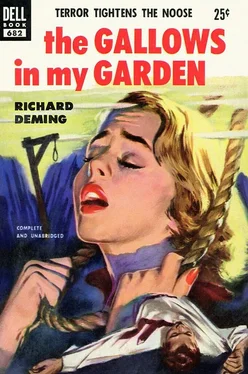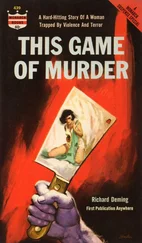Ann’s reply was in a soothing tone, but I was then too far away to catch it.
Warren Day glanced at me sharply as I re-entered the drawing-room. I ran a cup of coffee from the silver urn sitting on a small table, added cream, sloshed it around by rotating the cup, and sipped it thoughtfully.
“Well?” Day growled.
“Well what?”
“Where’s Mrs. Lawson?”
“Out by the bluff.”
“So!” He guffawed. “Gave you the brush-off. Haw, haw, haw!”
“She didn’t even see me,” I said. “I told you I was just going out for the air.”
His grin faded, and he regarded me suspiciously. At that moment the door opened and Mrs. Lawson came in followed by the doctor. Day’s face registered first surprise, then understanding, then vindictive enjoyment. The last emotion was for my benefit.
“Are there enough sandwiches, Inspector?” Ann asked.
“Plenty,” he said hastily. “Plenty, thank you.”
All in the same evening I had heard Warren Day say please and thank you. For the first time in my life I regretted not keeping a diary.
“I believe I’ll go up, then,” Ann said. “If you want to stay the night, Maggie will show you your rooms. Breakfast is at eight-fifteen.”
“We won’t stay,” the inspector said. “We’ll come back again about nine in the morning. I have to ask that none of your guests or servants leave the house until we give clearance, though.”
“All right,” she said. “Good night.”
All except Dr. Lawson told her good night. Instead he told us good night and accompanied her up the stairs. As they left the room, Day watched the dapper doctor’s back broodingly, then glanced down at his own rumpled shirt.
“Hannegan!” he suddenly blared at the startled lieutenant, who sat two feet away from him. “Start bringing in the servants.”
Clamping his mutilated cigar between his teeth, he surged to his feet and stalked back to the library-den.
The first to appear was Maggie, who gave a repeat performance of her opinion of the inspector by standing directly before him with her hands clasped in front of her, and fixing him with glittering eyes in which there was no trace of subservience.
“Sit down,” Day rasped.
“No thanks,” Maggie said, her tone indicating she had no intention of staying long enough to make sitting worth while.
“Stand, then,” the inspector said petulantly. “What’s your name?”
“Margaret Sullivan. Better known as Maggie.”
“You’re the housekeeper?”
“Yep.”
“What do you know about all this?”
“Nothin’. Will that be all, mister?”
“Listen—” Day started to say, but I broke in.
“Mind if I ask a couple of questions, Inspector?”
Day glowered at me, turned his eyes back at the housekeeper, then shrugged. “Go ahead.”
I said, “Have a chair, Maggie, and make yourself comfortable.”
“Thanks, sir,” she said, sitting primly on the straight-back in front of the desk and snorting obliquely in Day’s direction. Deep behind the surface frostiness of her eyes I imagined the hint of a twinkle.
The inspector’s long nose became pale on the tip, an infallible indication of anger. At headquarters Day’s nose was surreptitiously referred to as the “rage gauge,” for its relative paleness was an exact thermometer of his disposition. When it reached dead white, he became maniacal. Its present shade of paleness indicated only mild rage.
I said, “Maggie, you’ve been with the family a good many years, haven’t you?”
“Nineteen,” she said promptly. “Mr. Lawson hired me just after his missus died in childbirth, back when the family lived in the old house downtown.”
I said, “Sometimes a housekeeper knows more about her family than the family members do.”
Maggie nodded her head shrewdly. “I don’t know about other housekeepers, Mr. Moon, but I was never exactly just a servant. For ten years, until Miss Ann came along, I was the only woman in the house, and the nearest thing to a mother the kids had. Not that I ever been treated like another member of the family exactly, for Mr. Don was never one to ask hired help to sit at the same table, and my place remained in the kitchen, but I did have the care of the kids in a kind of governesslike way, you might say, and often they’d come to me about stuff they wouldn’t dare mention to their father. So if you mean do I know about young Don and Grace, I dare say I always knew more about what was going on in their minds than either Mr. Don or Miss Ann. I’ve no doubt what you’re getting at is was young Don the type of boy would commit suicide, so I’ll save time by telling you right out yes, which he did.”
She clamped her jaws after this remarkable dissertation and stared at me unwaveringly.
I said, “You’re a little ahead of me, Maggie, but go on. How was he the type?”
“He just was, that’s all. Understand, I wouldn’t say a word against young Don for the world. A fine boy inside he was, though a bit weak and terribly impulsive, which I blame mostly on his father. A child needs love, especially one with no mother, but Grace was Mr. Don’s favorite and there just wasn’t enough love in him left over for his son. Nor did his own sister understand the boy, or Miss Ann, either, for that matter, though I will say she made every attempt to get on with him, and young Don thought a lot of her. A moody boy he was, and easily hurt, and inclined to do crazy things on impulse, like the time he ran away and got married. You couldn’t get right inside his mind, for he was a deep one, and even me he never said a word to before he pulled that stunt.” She stared broodingly at her clasped hands, as though the memory of not being taken into his confidence still rankled.
“But what makes you think he was suicidal?”
“I don’t mean he was the type would go around thinking about it all the time, Mr. Moon. I mean he could have done it on impulse, if he got a nasty enough shock. Like the time his father had his marriage annulled, I saw him standing at the bluff looking down one day, and the expression on his face right scared me. For a week after that I kept my eye on him as sharp as possible, but nothing happened, so I thought it was just my fancying. But that spot was right about the one he must have finally jumped from.”
“What happened to the girl he married?” I asked.
Maggie shrugged. “None of us but Mr. Don ever saw her. Guess the mister bought her off and sent her packing.”
I asked abruptly, “Did you know someone was trying to kill Grace, Maggie?”
Her jaw dropped, and she gazed at me blankly.
“I guess you didn’t,” I decided.
“Here!” she said. “What’s this about Grace?”
“You’ll hear about it later,” I told her. “Any idea what could have made Don take his life?”
She nodded vigorously, but her expression was withdrawn and contemplative, her mind apparently still half on the question I had asked about Grace. “Woman trouble again. Who’s trying to kill Grace?”
“Never mind that now, Maggie. Who was the woman Don was troubled with?”
“Kate. I should have known better than to hire her in the first place, but young Don always could get around me, the young scamp. If I’d had any idea the way it would turn out, I’d never let him talk me into it. You can’t blame Kate, though, for she can’t help it young Don went so bad for her, and she never gave him too much encouragement that I could see.”
“Wait a minute,” I said. “Did Don bring Kate here?”
“That’s right. Where he met her, I don’t know, but she was out of work at the time and had good references, so when our other maid quit, he jumped me for the job before I could even phone the employment bureau. Plain nuts he was for her, and it’s my guess he jumped off the bluff because she wouldn’t have him.”
Читать дальше












